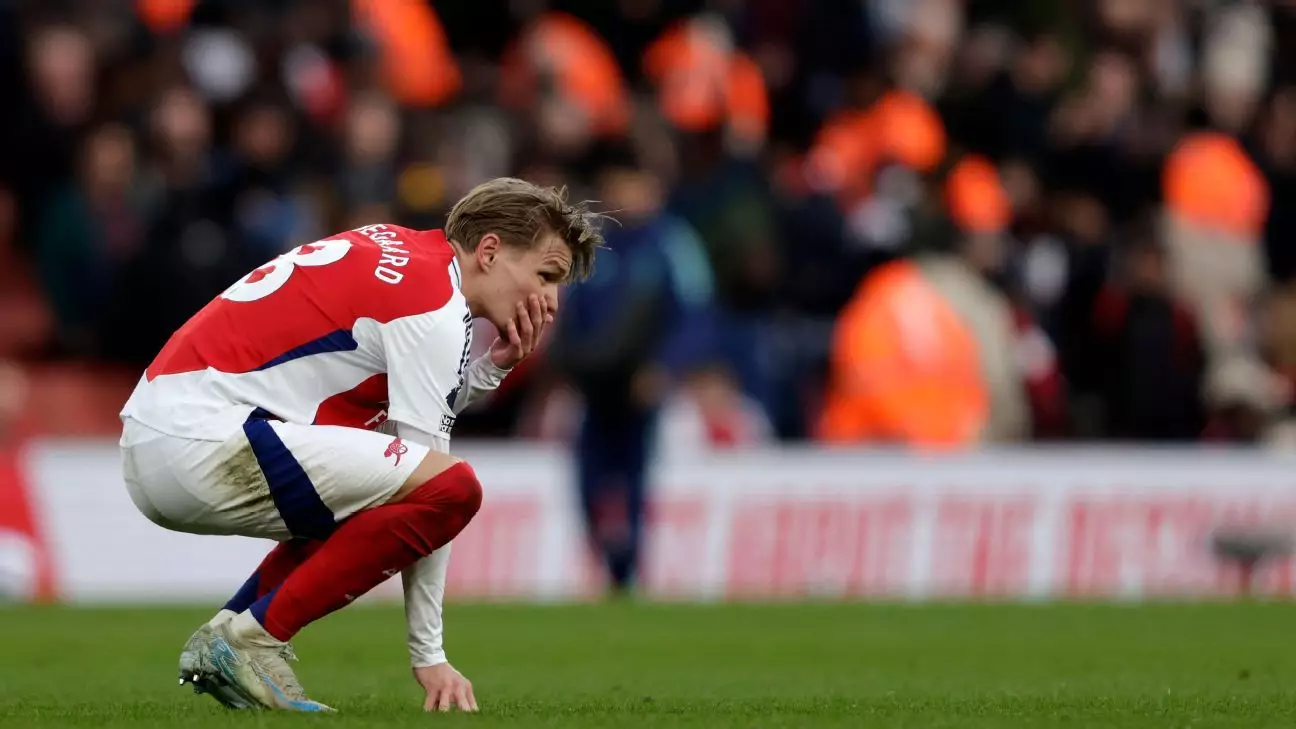In the high-stakes arena of the Premier League, every match carries weight, especially when title aspirations are on the line. Arsenal’s recent 1-0 setback against West Ham United raises critical questions about their ability to compete for the championship this season. Manager Mikel Arteta faces scrutiny not merely for the result but for decisions made that led the Gunners into a position of vulnerability. This article delves into the implications of the match and the ramifications for the club moving forward.
As the clock ticked down in the second half at the Emirates Stadium, Jarrod Bowen’s late strike provided a stark reminder of what Arsenal had lost: consistency and sharpness in front of goal. The match revealed the steep price of injuries, particularly the absence of key forwards like Kai Havertz and Gabriel Jesus. Arteta’s choices prior to the match seemed to reflect an unsettling complacency, most notably in the decision not to secure additional firepower during the January transfer window.
While the signing of striker Evan Ferguson on loan for West Ham could have felt like a taunt directed at Arsenal, the reality was that Arteta’s squad was left grasping at possibilities. Their unwillingness to spend an extra £20 million on a target like Ollie Watkins demonstrated a careful approach to club finances but may ultimately prove detrimental. As injuries pile up, Arsenal could find themselves regretting the hesitation that has led to a lack of depth in the attacking third.
A Frustrating Performance Under Pressure
When the final whistle blew, the discontent from the home fans reverberated throughout the stadium. The Gunners began with a semblance of energy, launching some promising attacks. However, as the game unfolded, they fell flat. Rather than maintaining consistent pressure, Arsenal often appeared content with recycling possession, leaving them without the dynamism necessary to penetrate a resolute West Ham defense. Their failure to translate possession into goal-scoring opportunities was alarming, evidenced by a mere two shots on target across the entire match.
Arteta’s frustration was palpable in his post-match comments. He acknowledged the need for collective accountability, taking responsibility for the shortcomings displayed by his players. Despite a commendable early intention to create opportunities, the team’s attack quickly became predictable and easy to stifle. Martin Ødegaard, in particular, lacked his usual creativity, while younger players like Ethan Nwaneri struggled to make an impact. The inability to adapt tactically was a key factor in the disappointing result.
The match’s turning point came during the second half when Myles Lewis-Skelly endured a moment of recklessness that resulted in a red card. A foul on Mohammed Kudus sent shockwaves through the team and the stadium, yet Arsenal’s ensuing performance did not indicate any sense of urgency. With a man advantage, one might expect a revitalized push for an equalizer; instead, Arsenal’s response was tepid at best.
The unease within the squad became more apparent as boos echoed when Ødegaard opted for a sideways short free-kick later in the game. This decision illustrated a broader malaise within the team, unwilling to take risks or capitalize on scoring opportunities. The home crowd—a vital twelfth man—began to dissipate, mirroring the decline in morale among the players.
Cautious Optimism or Inevitable Decline?
Despite the disheartening defeat, one could argue that dire situations sometimes foster resilience. Arsenal’s recent form suggests that they are not far removed from competing at a higher level; they had previously enjoyed a remarkable ten months without a league home loss before this match. However, the context feels different. With key players sidelined and a tough schedule ahead, it’s become increasingly challenging to envision a path back to the top of the table.
Prospects for recovery brighten somewhat on account of Liverpool’s upcoming fixtures, where they must face formidable opponents. Yet, Arsenal’s fate rests heavily on their response to this setback. The need for a swift recalibration in tactics and the ability to inspire confidence and creativity within the squad is paramount.
Concluding Thoughts
In concluding, Arsenal’s recent defeat serves as a stark reminder of the complexities of title contention. Mikel Arteta must confront the critical necessity of adaptability, both in strategy and personnel decisions, moving forward. With injuries continuing to plague the squad, and the looming consequences of their transfer window choices, the urgency to recalibrate their aspirations is clear. The onus is on Arsenal to navigate these turbulent waters not just for this season, but for their long-term viability as Premier League contenders.

